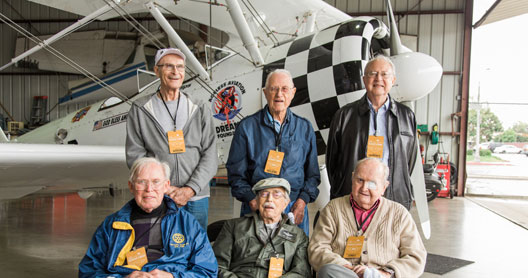American Hero
Our Community Members Are Heroes.
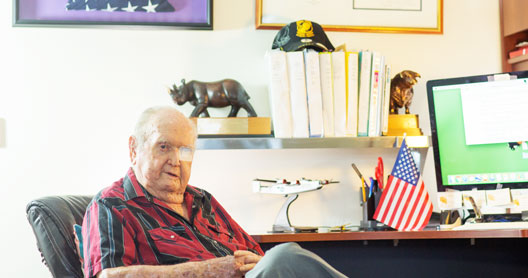
Colin had just graduated from high school in 1939 when he enlisted in the Army, following in his father’s footsteps. At the young age of 18, Colin was stationed at Hickam Field in Pearl Harbor, Hawaii. There, he completed his boot camp and was assigned to the 26th Bomb Squadron where he learned to fly on B-18 bombers.
On December 7, 1941, Colin was just getting out of bed to prepare for another day of flight training when the first bomb hit. “All at once there was a tremendous explosion as one bomb hit the mess hall and another our supply room just 150 feet away,” Colin recalls.
Unlike dozens of his fellow soldiers, Colin made it through the Pearl Harbor attack injured but alive. He was awarded the Purple Heart for his wounds. “After that day, I knew more than ever that I wanted to serve my country and fight the good fight,” he says. Colin completed his flight training, and joined the 8th Air Force’s 93rd Bomb Group.
He completed his first missions flying over Africa, but was then directed to Europe where pilots were desperately needed to combat the Germans. In September 1943 while flying a bombing mission over Germany, Colin’s plane was shot down by enemy fire. He and his crew were forced to bail from the plane. Of the 51 men in the mission, only four — including Colin — survived.
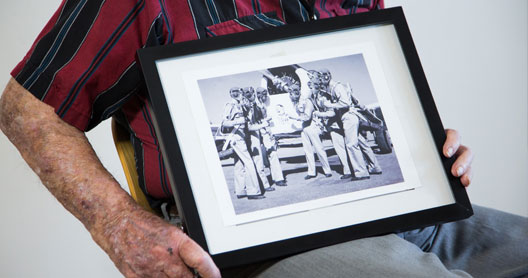
Colin’s parachute landed him in the countryside of Holland, where he was soon discovered by a civilian countryman riding by on his bike. “I’ll never forget that man,” Colin says. “He tried to rescue me, take me to his home to hide me, but we were stopped by German soldiers.”
Colin was sent to a POW camp on the island of Texel, off the Dutch coast. There, in Stalag XVIIB, Colin spent the next 17 months of his life. He explains, “At this point in the war, the German solders were in worse condition physically and mentally than a lot of the American POWs.”
Among the POWs in Colin’s camp were several radio operators. After bartering with the German soldiers, the prisoners secured the materials they needed to build make-shift crystal radios which they used in secret. “We picked up radio transmission from an American artillery group that turned out to be part of General Patton’s forces,” Colin recalls. “They were stationed in the hills close by our camp.”
When the POW camp received orders to march the prisoners back to Germany, Colin knew he had to attempt an escape while the American troops were still close by. Forced to march 10 miles a day through snow, the POWs started making the slow, treacherous trek toward the border. Time was running out.
One night while the exhausted German soldiers slept, Colin and a friend snuck away from the campsite. “We ran on foot for five days,” Colin remembers. “One day, we came across a Romanian gypsy family who fed us. It was the first solid meal we’d had in a very long time.”
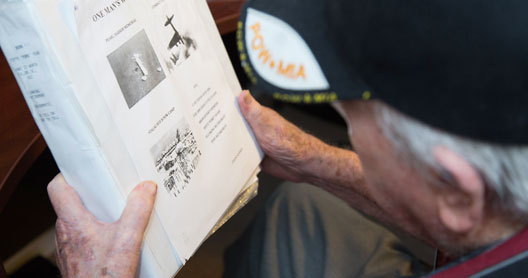
On the fifth day, Colin and his buddy came across the 13th Armored Division camped out on the banks of a river. They were home-free. “It took us a while to convince the soldiers that we were Americans too,” Colin says, smiling. “We had to tell them who won the last World Series. That convinced them!”
Colin was transported to Camp Lucky Strike where he received medical attention, losing an eye to injuries sustained from the plane crash. While recuperating, he was awarded several additional medals including a second Purple Heart for his bravery and service. When he was healthy enough, he took the 19-day boat trip back to Hawaii where he was met by his very proud and relieved father.
“The civilian who tried to rescue me in Holland had written my family a letter, letting them know I’d been captured,” says Colin. “But they didn’t know whether I’d made it through alive.”
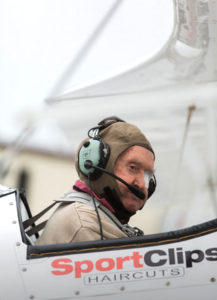
After the war, Colin went on to become a successful business and family man. He learned to love playing golf, and wrote a memoir of his life’s experience. At the age of 94, Colin’s never forgotten the brave men and women he fought with, the soldiers who lost their lives, the civilians who tried to help him, and the buddy who escaped with him.
The staff at Rowntree Gardens will never forget Colin’s sacrifice and service — and those of the many WWII and Korean War veterans in our community. Recently, Rowntree had the pleasure of helping Colin and several other WWII vets take to the skies once again. In an outing coordinated with the non-profit group Ageless Aviation, Colin had the chance to sit in the open cockpit of a 1944 Boeing Stearman biplane as it flew over Orange County.
“It was the first time in a long time I’d been up in plane,” Colin says of the experience. “I enjoyed it very much. I learned to fly in one of these.”
Colin’s story of courage, survival and resilience inspires us every day. We are dedicated to providing a welcoming home and family where heroes like Colin can continue to tell their stories, live with honor and dignity, and thrive among friends.
